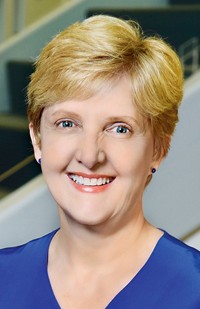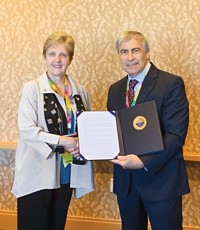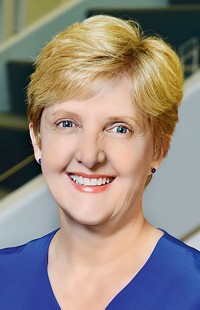Advertisement
Grab your lab coat. Let's get started
Welcome!
Welcome!
Create an account below to get 6 C&EN articles per month, receive newsletters and more - all free.
It seems this is your first time logging in online. Please enter the following information to continue.
As an ACS member you automatically get access to this site. All we need is few more details to create your reading experience.
Not you? Sign in with a different account.
Not you? Sign in with a different account.
ERROR 1
ERROR 1
ERROR 2
ERROR 2
ERROR 2
ERROR 2
ERROR 2
Password and Confirm password must match.
If you have an ACS member number, please enter it here so we can link this account to your membership. (optional)
ERROR 2
ACS values your privacy. By submitting your information, you are gaining access to C&EN and subscribing to our weekly newsletter. We use the information you provide to make your reading experience better, and we will never sell your data to third party members.
Comment
Growth, collaboration, and advocacy
by H. N. Cheng, ACS President-Elect
December 5, 2020
| A version of this story appeared in
Volume 98, Issue 47

Most of us in the chemistry enterprise appreciate the beneficial role of chemistry in our society. Chemistry provides employment to a lot of people in academia, industry, government, and nonprofit organizations. According to the American Chemistry Council’s 2020 Guide to the Business of Chemistry, the US chemical business in 2019 was a $565 billion enterprise that contributed $222.3 billion to the US gross domestic product. Nonetheless, employment in the US chemical industry has declined by about 20% in the past 30 years, according to data from the US Bureau of Labor Statistics. US government support for chemistry R&D has been relatively flat from 2011 to 2018, according to data from the National Science Foundation.
Although we sometimes hear that chemistry is a mature discipline, many areas within chemistry continue to grow, such as energy storage, catalysis, self-assembly, sensors, organic electronics, and sustainability. And many other areas of chemistry critically need our knowledge and skills, including human health, the design of molecules or materials that exhibit specific features or dynamics, chemical foundations of cells, chemical basis for cognition and memory, and the origin of life on Earth. As you can see, there are abundant opportunities for growth and discovery in chemistry.
The theme of my presidential year is growth, collaboration, and advocacy. In a competitive world, every discipline needs to aim for growth in order to thrive. There are several ways we can help grow the chemistry profession for the benefit of the discipline and ourselves.
Innovation and entrepreneurship. Innovation is the engine of growth. In chemistry, there is no shortage of publications and patents, but to translate discovery into commercialization, we should encourage entrepreneurship and academic-industrial-government interactions. To this end, I am collaborating with American Chemical Society Membership and Society Services staff, the ACS Division of Small Chemical Businesses, and the ACS Division of Business Development and Management to provide a series of ACS webinars on entrepreneurship training. We held two webinars this year (on Oct. 28 and Dec. 1) on how to write a business plan and obtain funding. More webinars are planned for 2021.
In addition, the ACS Division of Colloid and Surface Chemistry is organizing a presidential symposium on industrial and academic dialogue at ACS Spring 2021. Another presidential symposium on innovation, entrepreneurship, and collaborations is being planned for ACS Fall 2021.
Disciplinary growth. Today’s grand challenges for science and technology include renewable energy, clean air and water, food insecurity, population growth, climate change, diseases, and sustainability. We can expect that chemistry will play a major part in the complex, multidisciplinary approaches that will be necessary to achieve solutions. Indeed, many scientific advances occur at the interface between chemistry and other disciplines. In collaboration with the ACS Committee on Science, I am organizing a presidential symposium in 2021 that highlights the new frontiers and expanded opportunities for chemistry in our changing world.
As part of disciplinary growth, sustainability is vital to addressing the problems of pollution, waste, chemical hazards, and depletion of natural resources. I am a strong believer in sustainability and wrote a C&EN Comment on this topic in the Feb. 10, 2020, issue. Working with ACS staff, I have given several talks on sustainability and will continue to advocate for sustainable practices. I have just edited the two-volume ACS book Sustainability and Green Polymer Chemistry with Richard A. Gross. In collaboration with the ACS Division of Small Chemical Businesses, I co-organized a symposium called “Sustainable Green Chemistry: Bench to Market” during the ACS fall meeting in 2020 For ACS Spring 2021, the ACS Division of Agricultural and Food Chemistry has agreed to organize a presidential symposium called “Sustainability: Advances and Applications,” with an emphasis on food, agriculture, and biobased materials. The ACS Fall 2022 meeting will include a symposium on sustainability, with an emphasis on the use of polymers.
International collaborations. Since chemistry is an increasingly global enterprise, it behooves us to strengthen our international collaborations. Although the pandemic severely limited travel this year, I participated in virtual meetings with German, Brazilian, and Chinese American colleagues. I am also talking with international chapter colleagues in periodic dialogues arranged by ACS staff and the ACS International Activities Committee. I plan to continue these activities in 2021 and to promote international collaborations.
Advocacy. Continued advocacy is necessary to publicize the benefit of chemistry to policy makers and to the public. Building on advocacy workshops started by former ACS presidents Bonnie Charpentier and Allison Campbell, I am working with ACS External Affairs and Communications staff and the ACS Younger Chemists Committee to organize a virtual advocacy workshop for early-career chemists. ACS staff have developed an excellent online course on advocacy, available at Act4Chemistry.org.
I would appreciate the help and collaboration of ACS members to increase the impact of all the above activities. If you have any suggestions, please write to me at h.cheng@acs.org.
Views expressed are those of the author and not necessarily those of C&EN or ACS.





Join the conversation
Contact the reporter
Submit a Letter to the Editor for publication
Engage with us on Twitter